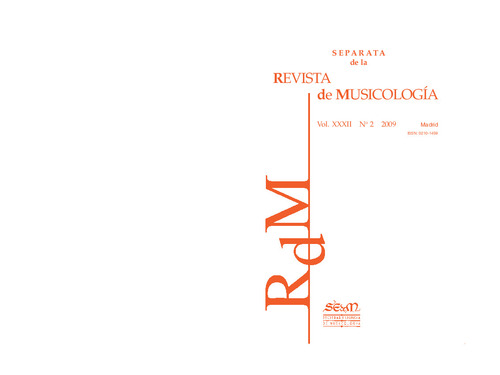El wagnerismo como transformador del espectáculo operístico en Madrid
Author:
Publication date:
Editorial:
Sociedad Española de Musicología (SEdeM)
Citación:
Descripción física:
Abstract:
El wagnerismo es un fenómeno clave en la evolución del espectáculo operístico en Madrid. La recepción de la música de Richard Wagner en la ciudad, impulsó cambios que afectaron a muy diferentes aspectos de las representaciones, algunos suscitados por la propia concepción dramática wagneriana y otros, como la llegada de la luz eléctrica o la retransmisión telefónica de las funciones, fruto del contexto histórico en que se produce este proceso. En lo que se refiere a la puesta en escena, la preferencia de Wagner por el mito y la leyenda, así como su particular concepción espacial, determinaron la aparición de los primeros rasgos simbolistas en la pintura escenográfica y la adopción de soluciones novedosas en maquinaria e iluminación. Otro logro wagneriano fue la interpretación en idioma original de las óperas alemanas, descartando la vieja costumbre de traducir al italiano las presentadas en el Teatro Real. Asimismo, el wagnerismo madrileño promovió la participación del coro en el movimiento escénico y la contención vocal y la expresividad gestual de los solistas. Por último, inculcó un cambio de sensibilidad entre el público: la formación de una nueva actitud de respeto ante el hecho artístico, alejada de la antigua mentalidad de acudir al espectáculo por conveniencia social.--Abstract: The concept of Wagnerism played a key role in the evolution of opera in Madrid. The reception of Richard Wagner’s music in the city prompted changes affecting many different aspects of opera performance, some caused by Wagner’s own concept of drama and others, such as the use of electricity or telephone broadcasts of opera performances, a consequence of the historical context in which this process took place. In regard to staging, Wagner’s preference for myths and legends, and his unique conception of space, led to the use of the first symbolist elements in scene painting and the adoption of innovative solutions in stage machinery and lighting. Another Wagnerian achievement was the performance of German operas in their original language, instead of translating the operas presented at the Teatro Real into Italian, as was customary. In Madrid, Wagnerism also furthered the participation of the chorus in stage movement, and led to soloists containing their voices and becoming more expressive in their gestures. Finally, Wagnerism brought about a change of awareness among audiences: the formation of a new attitude of respect for art, in contrast to the long-held mentality of attending the opera for social convenience.
El wagnerismo es un fenómeno clave en la evolución del espectáculo operístico en Madrid. La recepción de la música de Richard Wagner en la ciudad, impulsó cambios que afectaron a muy diferentes aspectos de las representaciones, algunos suscitados por la propia concepción dramática wagneriana y otros, como la llegada de la luz eléctrica o la retransmisión telefónica de las funciones, fruto del contexto histórico en que se produce este proceso. En lo que se refiere a la puesta en escena, la preferencia de Wagner por el mito y la leyenda, así como su particular concepción espacial, determinaron la aparición de los primeros rasgos simbolistas en la pintura escenográfica y la adopción de soluciones novedosas en maquinaria e iluminación. Otro logro wagneriano fue la interpretación en idioma original de las óperas alemanas, descartando la vieja costumbre de traducir al italiano las presentadas en el Teatro Real. Asimismo, el wagnerismo madrileño promovió la participación del coro en el movimiento escénico y la contención vocal y la expresividad gestual de los solistas. Por último, inculcó un cambio de sensibilidad entre el público: la formación de una nueva actitud de respeto ante el hecho artístico, alejada de la antigua mentalidad de acudir al espectáculo por conveniencia social.--Abstract: The concept of Wagnerism played a key role in the evolution of opera in Madrid. The reception of Richard Wagner’s music in the city prompted changes affecting many different aspects of opera performance, some caused by Wagner’s own concept of drama and others, such as the use of electricity or telephone broadcasts of opera performances, a consequence of the historical context in which this process took place. In regard to staging, Wagner’s preference for myths and legends, and his unique conception of space, led to the use of the first symbolist elements in scene painting and the adoption of innovative solutions in stage machinery and lighting. Another Wagnerian achievement was the performance of German operas in their original language, instead of translating the operas presented at the Teatro Real into Italian, as was customary. In Madrid, Wagnerism also furthered the participation of the chorus in stage movement, and led to soloists containing their voices and becoming more expressive in their gestures. Finally, Wagnerism brought about a change of awareness among audiences: the formation of a new attitude of respect for art, in contrast to the long-held mentality of attending the opera for social convenience.
ISSN:
Collections
- Artículos [37542]
- Historia del Arte y Musicología [499]
Files in this item




